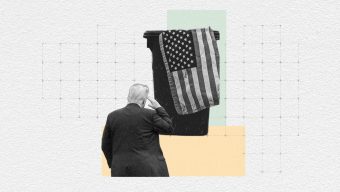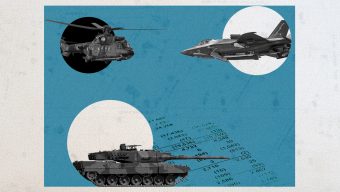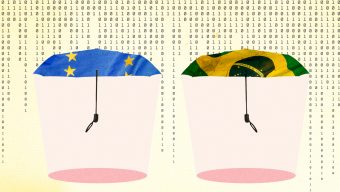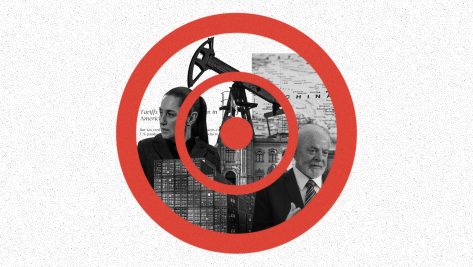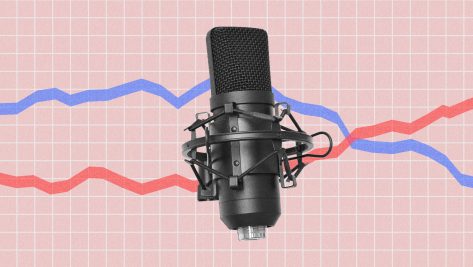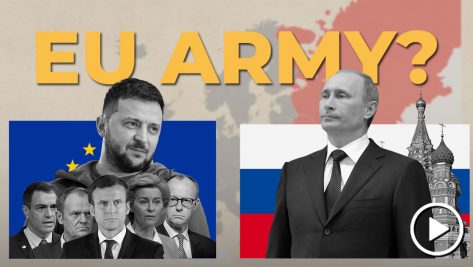Scope of Sports Ep 1: Sport and Politics
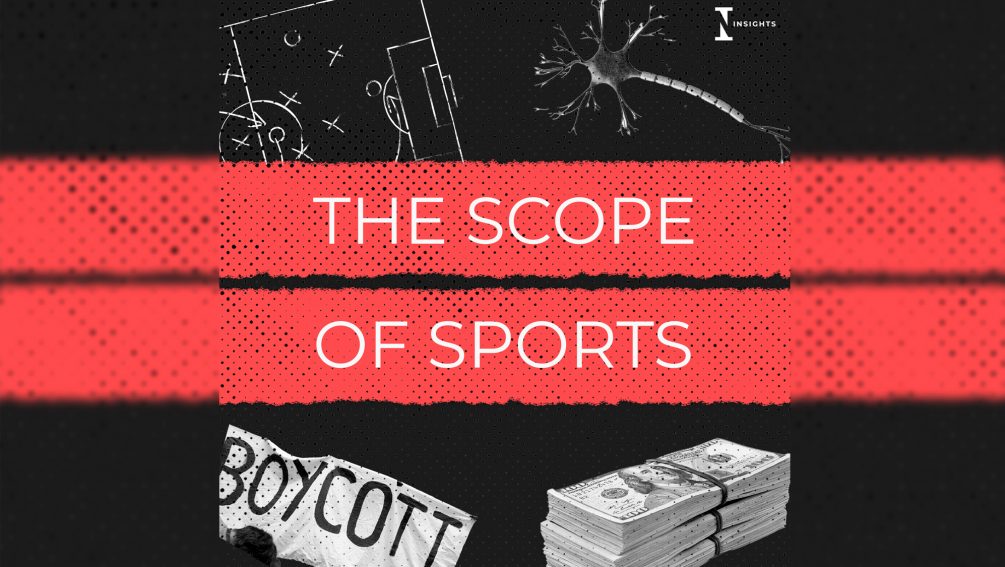
Sports ignite the passion of millions around the world, but they do not exist in a bubble. This podcast explores the relationship between sports and a range of fields – from politics to neuropsychology – by speaking to researchers and industry professionals.
In this episode, we speak to Professor Andrew Bertoli to explore how sports affect elections, nationalism, and global affairs.
© IE Insights.
Transcription
Alex Cope: Anyone with a passing interest in sports will know it has become somewhat intertwined in the world of politics. From petro-states owning professional football teams to state sponsored Olympic doping programs, the influence of politics can be seen at almost all levels of major sports. However, the reverse impact of this relationship is often neglected. So how do sports these pastimes, which ignite the passions of millions around the world, affect politics?
I’m Alex Cope, and we’re going to be talking today about the impact sports have on politics. With me today to explore this relationship is Andrew Bertoli, a professor at the School of Politics, Economics and Global Affairs, whose research specializes in how sports influences world politics. Hi, Andrew, and thank you for being here.
Andrew Bertoli: Oh, thank you for having me.
So to get us started, could you just give us an overview of the main ways in which sport affects politics? Is it limited to short term boosts in politicians’ approval rates, or are there broader, more international impacts?
Well, there are so many ways that sports affects the world. It’s really amazing. It’s a fascinating new field of research. People have been thinking about it for a while. And really the question you asked, I can only give a very incomplete answer because there’s so many questions out there that still need to be researched.
So what you mentioned, maybe what some listeners have already heard about is this idea that there’s a link between how a sports team performs and the leader’s approval rating. And this is a really striking finding because it’s not just that say if a national sports team does well, the national leader’s approval rating goes up. You might think that seems a little logical.
But the way this phenomenon actually works, it’s very illogical. It happens in cases where there’s a sports team that has no connection at all with the leader. But just the winner, the sports team. It makes the fans of the team happier. And those positive emotions that they get from sports, they bleed over into politics. And so if you ask them after like a big win, how do you feel about this politician who is not in any way connected to the sports team?
So a good example of this is in the US if a college football team wins. Researchers have asked students from that college: “w do you think of the president of the United States?” Like very separate from the college team, but there’s like a big boost in the approval rating of the president if the college football team wins. And there’s actually a drop if the college football team loses, which is really incredible.
Maybe it’s an example of an irrational pathway by which sports can affect things is something that very few people would have thought this, right? And there’s a lot of other studies now looking at short term and long term impacts of sports, with a variety of different outcomes. And a lot of them have these very surprising findings that you wouldn’t expect.
And looking more internationally, do major events like the Olympics and the World Cup have impacts on international politics or on trade?
I definitely think so. If you think about an event like the Olympics, a lot of people, they say that the Olympics are apolitical, like you’re supposed to keep politics out of the Olympics.
In my opinion, the Olympics are politics on steroids. And the first thing you have to realize about the Olympics is there’s a very conscious decision. I mean, it was made over a hundred years ago, but it still embodies the Olympic spirit, which is to have athletes compete as members of nations. Okay. So you might think, hey, the Olympics should really be about bringing the best athletes in the world together to compete in the sport.
But that’s not really what the Olympics is about, it’s about this national competition. And so if you’re like the third-best backstroker in the entire world, you would think you get a bronze medal at the Olympics. But the first and second best backstrokers are from your country. You might not even get to go to the Olympics because there’s like a cap on the number of people who can participate for each country.
So the idea of people competing for their nations. It leads to some sort of strange dynamics like this. And it doesn’t necessarily make the most sense. What I’m trying to say is that it’s kind of an artificial way of doing it that was decided upon a long time ago. But it reinforces this idea that the world is divided up into nation-states. And this is the correct way to think about the world. One of the most important aspects of any person is the nation that they belong to,
You think about an athlete who wins, they go up on the podium and they, you know, they accept the medal. They have to wear their national colors and the anthems playing.
It’s basically sending the message that there is this natural way of thinking about the world that is centered around nation-states. But a lot of people would disagree with that, right? A lot of people would say, like, we should really think of our shared humanity or, you know, maybe the family is the most important thing or the city that you’re from.
So the way that sports are organized, international sports, the fact that their international sports, it makes them kind of political by definition and reinforces a certain political ideology about how the world should be organized.
And this almost artificial division by nations and into nation-states, especially at major events like the World Cup and Olympics, as we said. Does that see a difference or a surge in nationalism in these countries during the events?
There are a lot of scholars that have looked at nationalism from sporting events and a consistent comparison that I’ve seen a number of people make is that there’s basically two things that will lead to a massive spike in nationalism. The first would be something like a war national tragedy or something really awful that happens that just unites the country around this threat or this danger.
The other is sports. They bring the country together and there’s really not a whole lot else in international relations that brings people together like those two categories of things. Right. And so lots of research now in sport, linking sports to nationalism and different types of nationalism. It can depend on the country. Like some countries, a sporting event might prime a certain type of nationalism that differs from another country.
Iceland’s one of my favorite counter-examples because we think we think of sports nationalism as being very belligerent a lot of the time, and a lot of time it is. But you also have an example like Iceland, where the nationalism almost had like a spirit of international cooperation, like a lot of sports fans would think of their nationalism through the lens of wanting to work with other countries, which is a very interesting development.
So I don’t think it’s always one way. But overall, there is this link between sports and different forms of nationalism, often bellicose forms of nationalism.
And because a lot of research suggests the increased nationalism can lead to military conflict, be it internal or international. So if we take the sporting event, do we ever see maybe not direct causation, but some kind of link between major sporting events and conflict, or is that a link too far?
I don’t think it’s a link too far. I mean, the most famous example is the football war, which is a case where there was there was a very politically tense environment between El Salvador and Honduras. This was in 1969, and the war was triggered by riots from the from the World Cup qualification matches to go down.
And there are a lot of other examples you can point to in history. Usually what happens is there’s a very tense political situation. Then the nationalism from the sporting events kind of pushes things over the edge and you get sometimes the military conflict. It’s not that common, but it has happened. Other times you just get some type of diplomatic political dispute between the two countries that it can sometimes be serious and sometimes undermine international cooperation, like a spike in tension.
This is in fact what I focused on in my dissertation. I look at a number of cases in history, and I also try to test statistically, and I did find that I think pretty conclusive statistical evidence that at least the FIFA World Cup, which is, you know, the event that probably people are most passionate around the world and I think it does have a lot of positive effects, it is not what I focus on my dissertation, but I don’t want to say it’s all bad now.
But when it comes to potentially making political disputes more intense, I think the nationalism that comes from an event like that is that prominent, that’s that important to the world. It can have that side effect, I believe. And if we so if it can have this negative effect, like you said, there are also some positive effects.
And if we take football or soccer as an example, modern clubs almost function like religions for a lot of people, and they’re made up of people, well, players of all different ethnicities from all different walks of life. Can this have a positive impact on how the fans of those clubs see people, their world view, or on their prejudices?
Oh, absolutely. I think a lot depends on the context, right? Because there are some clubs where you have the team or the fan base or both are ethnically diverse or religiously diverse and taking part in that shared experience can bring people closer together.
There are other cases where you have teams or fan bases that are very closely linked to one particular group. So what comes to mind for me would be the Celtic-Rangers rivalries in Scotland. And you know how those teams, many people perceive them to sort of represent two different ethnic and religious groups. And in a case like that, you might expect the sort of sport to lead to increased tension within the community.
So it’s a mixed bag at that level. It depends a lot, I think a lot on the context.
And does that really depend often on how the sports player or the sports team is performing? If a sports player from a different ethnic background is performing well, are you more likely to see less prejudice amongst the fan base or is it a bit more random?
I think intuitively you’d believe that to be true. And there is some research in political science suggesting looking particularly at Liverpool and the star soccer player Salah, and the effect that he’s had in reducing anti-Muslim sentiment in Liverpool. I do think that you would expect if there’s a star player from a minority background, that could reduce prejudices.
And conversely, if that star player or any player really on the team, he’s from a minority background, if things don’t go well and that player gets blamed for why things didn’t go on, there’s the scapegoating element which happens. does happen quite a bit, then that could potentially make things worse. So it’s maybe a little bit of a double-edged sword.
I guess, like we saw in my home nation, England, during the Euros when three black players missed penalties and then we suffered racial abuse. I guess that’s the other side of that sword.
There was a lot of positive support for those players too, that following the racial abuse. And you could say that what happened to raised awareness of racism. Right. So I would need to see get out and research on that specific case. I’m not even sure in that case that it increased racism. It might have brought a small percentage of people out who are racist. And then there’s people I feel like there are a lot of people on social media condemning the racist sentiments that came out of that. The bottom line is, I’m not really sure… I’m not comfortable, you know, saying what that effect might be. But it’s a complicated story, I think.
Yeah, I guess it’s hard to quantify the backlash against the backlash and what causes what. And a lot of your well, some of your more recent research has looked at the role of sport in bans and change in state behavior. What are the motivations of these bands that we see we’ve seen against Russia recently and other nations?
So there haven’t been that many sports fans in history. It’s surprising, in fact, how few there have been. I think the IOC and some of the other major sports organizations, they want to be very inclusive. They don’t want to discriminate based on political ideology or a lot of other factors. Even some in the past, they’ve been pressured. For an example would be the 1980 boycott of the Soviet Union after its invasion of Afghanistan.
So the organizations, they want to try to at least claim to stay out of politics, meaning historically there haven’t been that many cases. But if you look at the actual cases, the motivations behind them are incredibly diverse. Okay. So it could be a case like South Africa where I guess initially that the government in that case, it actually was the sports teams from South Africa that were showing up at events. They were like pretty much all whites or and that it’s you know, whites are a minority of the population.
So that this is during apartheid.
This was during apartheid. Yeah. So initially the ban was just so obvious that there was discrimination against black athletes. And so that’s how it started. And then it became more about just ending apartheid altogether later on.
But that would be a case of racial discrimination legally, then. But what we saw with Russia’s invasion of Ukraine, that’s been an effort to punish Russia for the actions it’s committed against Ukraine. And we’ve seen probably the most common cause of why countries get banned is if the government starts to interfere in the National Olympic Committee, because the IOC wants the National Olympic Committees to be independent of the government.
So these are each nation state’s individual national Olympic committees.
They’re often made up of former Olympic athletes from that nation. Yeah. And they’re supposed to act freely. It’s government interference. But probably I’d say about half the cases of sports around there, they’ve resulted because the government started getting involved in trying to control the national sports teams.
And that’s a quick way to get banned by the IOC.
And is there a danger with these bans, which I guess are aimed at the government or the state, have more of an impact on the individual athletes rather than the state themselves?
That’s certainly a concern. And it’s a concern that often gets raised when you see a ban and it can be a potential threat to at least a partial threat to the legitimacy of the ban. If it seems like the ban is unfairly targeting certain individuals, sometimes you don’t even support the actions that the government is taking. So it’s absolutely a concern that often gets raised. And as a social scientist, I am interested in the ethical dimensions of it, no doubt. But what jumps out to me is about it is the potential it might have to de-legitimize the ban, because if the ban is there to send a message, then you want to have the moral high ground.
Right. And it raises, you know, a potentially problematic situation for the international community. If it seems like the ban is unfairly targeting certain athletes, I think that’s something that often needs to be addressed in these situations. And like you said, the IOC, the International Olympic Committee, is famous for saying it’s apolitical. And like you said, it’s clearly failed.
So this isn’t something that you see going away, right, that sports and politics are intertwined and it’s not something they’re successfully managing to keep apolitical?
Well, I would say so. The IOC has always claimed to be apolitical. But as I mentioned at the beginning, just the fact that you’re having a competition between nation-states makes it political by definition. And so the IOC, I think when the IOC says it wants to be apolitical, I think it’s like you saw with the 1980 boycott of the Moscow Olympics, they didn’t want to have to move the Olympics because of the war. They often don’t want historically, at least a lot of protests at the Olympics that send a message that there’s actually a lot of controversy.
The athletes are not always very happy with the governments that they are representing or the countries that they’re representing. And so the Olympics, I think, is going to continue to want to keep those aspects of politics out to the extent that it’s possible and to the extent that it’s, in their view, good for the Olympics, keeps things organized and keeps them less controversial.
But I also think there’s just been a change in sort of how we think about athletes in recent years and what they go through. And also just our expectations about celebrities in general and, you know, the stances they take and even their responsibility. And a lot of people would feel that celebrities have a certain responsibility to speak up about issues.
I think there are societal changes that now it’s more expected. And maybe that’s something that’s going to push the IOC and some of these other organizations to allow a little bit more these political controversies into their events.





